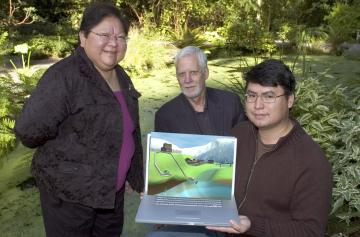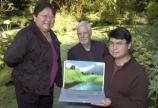Training Indigenous “water-keepers”
- Crystal Bergeron

While providing clean, safe and secure drinking water to Canada's First Nations communities is a top priority of the federal government, providing an effective instructional tool for the training of Aboriginal small water systems operators is the top priority for UVic education professor Dr. Don Bergland, MDA's (MacDonald Dettwiler and Associates) Russ Baker and their unique "water-keepers" team.
Since the Walkerton water contamination tragedy and the forced evacuation of hundreds of people from the Kashechwan Reserve in northern Ontario, the federal government has vowed to upgrade the standards for the operation of Canadian water systems. As a result, all water systems operators, including small water systems operators in rural Aboriginal communities and First Nations reserves, must now hold valid certification from their respective provincial bodies.
"Presently, level 1 certification requires completing a difficult training course, passing an exam and on-site experience of up to one year-a 'textbook' method of learning which is not conducive to many learners," says Bergland, the team's creative director. The group's initial needs assessment determined that First Nations operators learn most effectively through visual, hands-on, experiential problem solving.
"Often, even veteran operators with years of applied experience end up failing the exam. Our challenge was to take this vast quantity of written textual material and convert it to multimedia formats to create a practical learning resource for immediate implementation among First Nations communities in British Columbia," he adds.
Although Bergland and Project Director Russ Baker have had previous success designing learning technologies for NASA and other industry training programs, this was the first time they collaborated from an Aboriginal perspective.
The pair was adamant that the project be constructed and produced by First Nations media interns under the mentorship of industry specialists Robert Aiken (Kazoo Studios in Victoria) and Markus Tessmann (formerly of Disney) and consultants from many Aboriginal communities in British Columbia.
Bergland was pleasantly surprised by the level of technical expertise and talent each of the Aboriginal interns brought with them. "They were very knowledgeable about their specific media areas and were able to provide excellent input during both the design and production phases," he says. A unique byproduct of the project was the reverse mentorship that occurred on a daily basis. While the team leaders were responsible for sharing their technical expertise with their young prot&e#180;g&e#180;s, the interns were equally keen to share their First Nations culture and knowledge with their senior colleagues.
The team has now completed an innovative delivery system using 3D modeled simulation. The software teaches participants through an interactive First Nations training model of learning. Dr. Lorna Williams, Canada Research Chair in Indigenous Knowledge and Learning in the Faculty of Education, explains: "In the past, information provided to First Nations training program participants had always been presented in a linear, literacy-based fashion, fragmented, abstract and analytical, showing very little relationship between the actual work and what was presented in the program. Dr. Bergland's project brings all those real-life, holistic elements back into the learning by providing a strong and coherent connection to reality. It provides endless opportunities for review, integration and synthesis. It makes it much easier to transfer the learning back into the actual work they will be tasked with. It isn't about the lack of ability to learn, but rather the process that was used to engage the learning that was the barrier."
Intern Daniel Smith, a Kwakwakawakw graphic designer adds, "This concept of learning and teaching is almost 'too' appropriate. It's as if current education has missed a step in the learning process. By creating an interactive environment we are in fact going back in time to retake that missed step in order to learn."
Dean of Education Dr. Ted Riecken, whose own research interests involve digital media, is extremely supportive. "This project is significant for us because it brings together our strong interest in Aboriginal education and leading edge research in the application of digital technologies to education. Dr. Bergland has significant industry and instructional experience as a digital media designer. His reputation as an excellent instructor and creative artist made him a natural for hosting this project."
Funded by Indian and Northern Affairs Canada (INAC) through the First Nations Education Steering Committee, the project is set to launch Nov. 4 at the INAC Small Water Operators' Conference in Vancouver.

